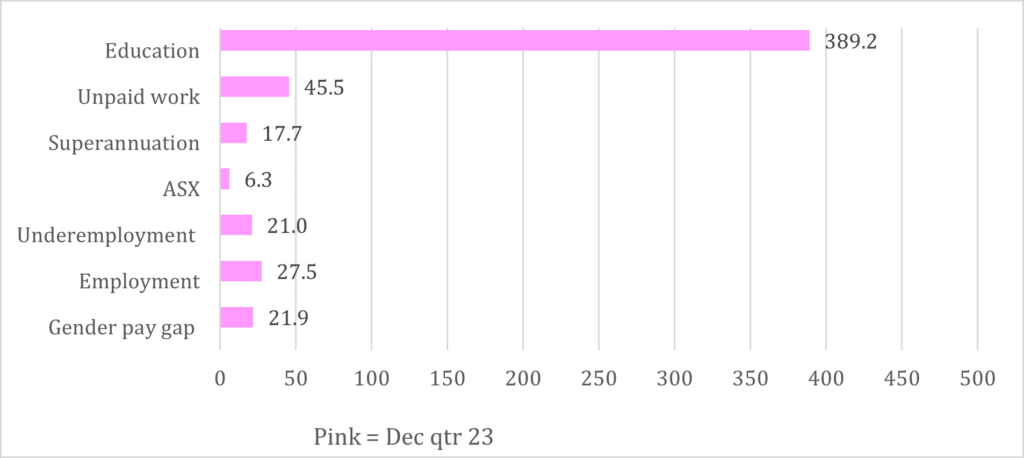Progress to economic equality in Australia went backwards in 2023 as an increasing number of women were unable to work to their desired potential and continued to do the bulk of unpaid work, the latest Financy Women’s Index (FWX) shows.
With International Women’s Day on Friday March 8, the FWX helps to contextualise the state of economic equality in Australia in light of recent events, by measuring years to parity across 7 critical indicators*.
Overall, the FWX fell 1 point (pt) to 75.5 pts out of 100 over the 2023 calendar year, with the December quarter (-2pts) firmly putting the brakes on progress.
“In 2024, it is inexcusable that progress towards women’s gender equality should be heading backwards on a number of fronts,” said Nicki Hutley consulting economist. “While we celebrate progress in board rooms, International Women’s Day needs to see further bold action from corporates and governments, offering women more pathways to meaningful, well-paid careers of choice.”
The results were largely affected by a deterioration in the gender gaps in the Underemployment Rate (-1.56 pts) and Unpaid Work (-2.19 pts) which offset improvement in the Gender Pay Gap (+1.29 pts).
The Underemployment rate gender gap worsened as the female underemployment rate hit a two year high with fewer people unable to secure the work they wanted.

This has come at a time of record unemployment, higher cost of living pressures and constraints in full time work hours in female-heavy industries like Accommodation and Food Services and Rental, Hiring and Real Estate Services
“Despite 2023 being a busy year for regulatory changes such as WGEA gender pay gap transparency for private companies, and also social events like the Matildas in the FIFA World Cup, Barbie Movie and Taylor Swift’s Eras tour, Australian women remain unable to realise their full economic potential,” said Financy founder Bianca Hartge-Hazelman.
“The recent public release of company pay gap data in Australia shines a spotlight on the ongoing issue of women in 2024 being unable to reach their full potential and the long-term implications of this, ranging from inadequate superannuation savings at an individual level to the limitations placed on Australia’s economic capacity and growth,” she said.”
One of the biggest barriers to gender equality remains unpaid housework and care, with the FWX Unpaid Work sub-index worsening over 2023 as the underlying gender gap widened, as reflected by 2022 HILDA Survey data published in the recent December quarter.
Whilst both women and men spent 2% fewer hours on unpaid housework and childcare, the gender gap didn’t close because women continued to do the lion’s share of domestic tasks (59% female v 40% male expressed as percentage of total paid and unpaid work).
Timeframes to equality in unpaid work now stand at 45.5 years in 2023 and 21.9 years for the gender pay gap, the FWX shows. The median timeframe to economic equality is 27.7 years.
Dr Shane Oliver, chief economist at AMP, notes there is still a long way to go in achieving gender financial equality.
“To properly address financial inequality requires a multi-faceted approach – including removing conscious and unconscious gender bias, making it even easier for women to stay fully in the workforce after having children, men taking on more unpaid family work, making it easier for young girls to assess the financial consequences of their study and career choices, and maybe even making men more like women in some ways.
“The phenomenal success of Taylor Swift as highlighted by her Eras Tour in Australia provides a powerful reminder that women are just as capable and talented as men, including in business. And that young women are likely to have a radically different and more demanding mindsets to their mothers and grandmothers around issues of gender equality, which is something no business can ignore,” said Dr Oliver.
The Gender Pay Gap was increasingly in focus over 2023 with the FWX Gender Pay Gap sub-index improving to 88 pts in December 2023 as the gender pay gap fell to a record low of 12%, as measured by the ABS Full Time Adult Average Weekly Ordinary Times Earnings.
“Based on the 2024 WGEA gender pay gap transparency campaign, we would expect that gender gap gaps will slowly improve across industries,” said Hartge-Hazelman.
“However success will depend on stakeholder pressure at a company level, and how organisations respond to it, as well as the removal of any conscious or unconscious gender bias, making it easier for women to return to and stay in a company after starting a family.
There also needs to be a focus on the number of women not only in leadership positions but those working in male-dominated industries such as Construction,” says Hartge-Hazelman.
The FWX Underemployment sub-index deteriorated in 2023 due to the female underemployment rate worsening to a greater extent than male.
However, the FWX Employment sub-index improved (0.53pts) to 72.9 pts in 2023 as women increased their number of monthly hours worked by 1.6% during the calendar year, outpacing the rate of growth among men’s monthly hours work, up 0.8%.
The capacity of the available female workforce in Australia to engage in paid work is now running at 63% compared to 87% for men.
The latest Financy Women’s Index couldn’t be more timely or relevant, said Natalie Previtera, CEO of NGS Super.
“Against a backdrop of WGEA’s latest report and International Women’s Day focused on ‘Accelerating gender equality through economic empowerment’, now is the perfect time to continue the conversation around the gender pay gap, and the knock-on effect on every facet of women’s lives.
“There is no silver bullet to bridge the gap, but there are many steps we can take to incrementally work towards equality through economic empowerment. I’d like to see us leverage the insights from the FWX not just to measure progress, but to fuel our collective efforts towards a more equitable future,” said Previtera.
Financy covers gender finance, diversity, inclusion and ESG issues. We advocate for gender equity change through the Women’s Index report and help businesses take action on DEI through tech solutions like IMPACTER.













